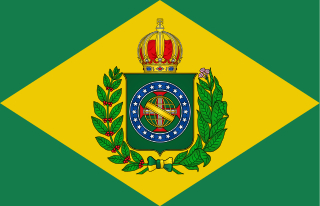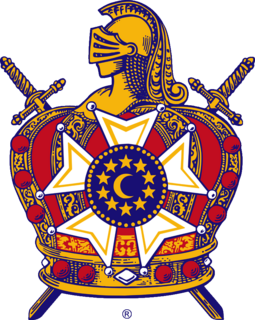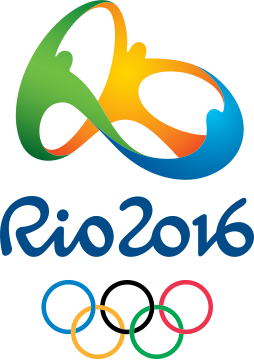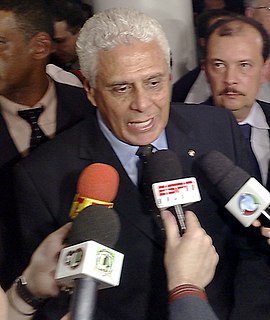
The FIFA World Cup, often simply called the World Cup, is an international association football competition contested by the senior men's national teams of the members of the Fédération Internationale de Football Association (FIFA), the sport's global governing body. The championship has been awarded every four years since the inaugural tournament in 1930, except in 1942 and 1946 when it was not held because of the Second World War. The current champion is France, which won its second title at the 2018 tournament in Russia.

Edson Arantes do Nascimento, known as Pelé, is a Brazilian former professional footballer who played as a forward. Regarded as one of the greatest players of all time and labelled "the greatest" by FIFA, he was among the most successful and popular sports figures of the 20th century. During his playing days, Pelé was for a period the best-paid athlete in the world.
Mac or MAC most commonly refers to:

Ronaldo Luís Nazário de Lima, commonly known as Ronaldo, is a Brazilian business owner, president of La Liga club Real Valladolid, and a retired professional footballer who played as a striker. Popularly dubbed in Portuguese O Fenômeno, he is widely considered one of the greatest players of all time. As a multi-functional striker who brought a new dimension to the position, Ronaldo has been the influence for a generation of strikers that have followed. His individual accolades include being named FIFA World Player of the Year three times, and winning two Ballon d'Or awards.

The Brazil national football team represents Brazil in men's international football and is administered by the Brazilian Football Confederation (CBF), the governing body for football in Brazil. They have been a member of FIFA since 1923 and a member of CONMEBOL since 1916.

Clube de Regatas do Flamengo, commonly referred to as Flamengo, is a Brazilian sports club based in Rio de Janeiro, in the neighbourhood of Gávea, best known for their professional football team.

Sociedade Esportiva Palmeiras is a Brazilian professional football club based in the city of São Paulo, in the district of Perdizes. Palmeiras is one of the most popular clubs, with the most trophies and the most success in Brazil, with around 18 million supporters and 126,000 affiliated fans, including many Brazilians of Italian ancestry. Despite being primarily an association football team, Palmeiras competes in a number of different sports. The football team plays in the Campeonato Paulista, the state of São Paulo's premier state league, as well as in the Brasileirão Série A, the top tier of the Brazilian football league system.

The Empire of Brazil was a 19th-century state that broadly comprised the territories which form modern Brazil and Uruguay. Its government was a representative parliamentary constitutional monarchy under the rule of Emperors Dom Pedro I and his son Dom Pedro II. A colony of the Kingdom of Portugal, Brazil became the seat of the Portuguese colonial Empire in 1808, when the Portuguese Prince regent, later King Dom João VI, fled from Napoleon's invasion of Portugal and established himself and his government in the Brazilian city of Rio de Janeiro. João VI later returned to Portugal, leaving his eldest son and heir, Pedro, to rule the Kingdom of Brazil as regent. On 7 September 1822, Pedro declared the independence of Brazil and, after waging a successful war against his father's kingdom, was acclaimed on 12 October as Pedro I, the first Emperor of Brazil. The new country was huge, sparsely populated and ethnically diverse.

The president of Brazil, officially the President of the Federative Republic of Brazil or simply the President of the Republic, is both the head of state and the head of government of Brazil. The president leads the executive branch of the federal government and is the commander-in-chief of the Brazilian Armed Forces. The presidential system was established in 1889, upon the proclamation of the republic in a military coup d'état against Emperor Pedro II. Since then, Brazil has had six constitutions, three dictatorships, and three democratic periods. During the democratic periods, voting has always been compulsory. The Constitution of Brazil, along with several constitutional amendments, establishes the requirements, powers, and responsibilities of the president, their term of office and the method of election.

DeMolay International is an international fraternal organization for young men ages 12 to 21. It was founded in Kansas City, Missouri, in 1919 and named for Jacques de Molay, the last Grand Master of the Knights Templar. DeMolay was incorporated in the 1990s and is classified by the IRS as a tax-exempt 501(c)(3) organization.

The Brazilian Football Confederation is the governing body of football in Brazil. It was founded on 8 June 1914 as Federação Brasileira de Sports, and renamed to Confederação Brasileira de Desportos in 1916. The football confederation, as known today, separated from other sports associations on 24 September 1979. Between 1914 and 1979 it was the governing body, or at least the international reference, for other olympic sports, such as tennis, athletics, Swimming, Waterpolo, Handball. It currently has the most wins on FIFA world cups, with a total of 5 wins.

The 2016 Summer Olympics, officially known as the Games of the XXXI Olympiad and commonly known as Rio 2016, was an international multi-sport event held from 5 to 21 August 2016 in Rio de Janeiro, Brazil, with preliminary events in some sports beginning on 3 August. Rio was announced as the host city at the 121st IOC Session in Copenhagen, Denmark, on 2 October 2009.

The CONMEBOL Sudamericana, named as Copa Sudamericana is an annual international club football competition organized by CONMEBOL since 2002. It is the second-most prestigious club competition in South American football. CONCACAF clubs were invited between 2004 and 2008. The CONMEBOL Sudamericana began in 2002, replacing the separate competitions Copa Merconorte and Copa Mercosur by a single competition. Since its introduction, the competition has been a pure elimination tournament with the number of rounds and teams varying from year to year.

The Brazilian Olympic Committee or BOC is the highest authority in Brazilian sport and the governing body of Brazilian Olympic sport. It was officially founded on June 8, 1914 but World War I caused its official activities to begin only in 1935. It was founded at the headquarters of the Brazilian Federation of Rowing Societies as an initiative from the Metropolitan League of Athletic Sports.

Carlos Roberto de Oliveira, known as Roberto Dinamite is a Brazilian former footballer and politician. He was born in Duque de Caxias, Rio de Janeiro state. With a career as centre forward spanning over twenty years, Roberto is Vasco da Gama's player with the most appearances and all-time top goalscorer, as well as the overall leading scorer in the Brazilian Série A. At the national level, Roberto Dinamite played in the 1978 and 1982 FIFA World Cups and the 1972 Olympic Games. He was president of Vasco da Gama from 2008 to 2014.

The Rio de Janeiro bid for the 2016 Summer Olympics and Paralympics was a successful bid to host the Games of the XXXI Olympiad and the XV Paralympic Games, respectively. It was submitted on September 7, 2007, and recognized as an Applicant city by the International Olympic Committee (IOC) one week after. On June 4, 2008, the IOC Executive Board shortlisted Rio de Janeiro with three of the six other Applicant cities—Chicago, Madrid and Tokyo; over Baku, Doha and Prague—becoming a Candidate city during the 2008 SportAccord Convention in Athens, Greece.

The 2011 Military World Games, officially known as the 5th CISM Military World Games, was hosted from July 15–24, 2011 in Rio de Janeiro, Brazil.
The Ministry of Education, also known as MEC, an initialism derived from its former name Ministry of Education and Culture, is a cabinet-level federal ministry of Brazil.

Women's football is not as popular in Brazil as men's football, although it has increased in popularity in the 2000s.

Azerbaijan–Brazil relations refers to the bilateral relations between Azerbaijan and Brazil.















